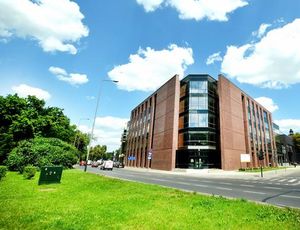
The last several months of the pandemic have completely turned our lives upside down. However, during that time, the Jagiellonian University’s Faculty of Philology has greatly intensified its collaboration with institutions from abroad. Using the latest technological achievements and modern e-learning platforms, the students and staff were able to communicate with scholars from all over the globe.
‘The pandemic surprised us as much as everyone. We weren’t prepared for remote work; for moving from pulpits to our desks, so to speak. However, we’ve had some past experiences that allowed us to adapt to the new situation rather quickly’, said the Dean of JU Faculty of Philology Dr hab. Władysław Witalisz, Prof. UJ.
Although most of the initiatives carried out at the Faculty would have still been taken up regardless of the pandemic, digital forms of communication have facilitated international collaboration. The number of projects run at the Faculty’s units is very high. For instance, the Institute of Slavonic Studies organised remote translation workshops for Slovakian Studies students with native speakers from the University of Presov. Additionally, since the start of the pandemic, it has also organised monthly meetings called Bohemian Thursdays, during which students are able to have a conversation with guests from the Czech Republic. Thanks to the on-line formula of these events, they can be attended not only by JU students, but also by participants from all of Poland and abroad. The Institute of Romance Studies arranged meetings with two Brazilian writers, while its students also took part in a competition devoted to the life and work of Dante Alighieri organised by the Institute of Italian Culture in Kraków.
In December, students of Swedish Studies celebrated Saint Lucy’s Day. The live stream of the event was watched by 500 people, which would be impossible under ordinary circumstances. The students were also able to attend a meeting with a blogger from the Faroe Islands as well as practical language classes with a Swedish native speaker.
‘The Institute of English Studies hosted a number of on-line meetings, such as the ones with experts in American culture and literature: Dr Pip Gordon (University of Wisconsin-Platteville) and Dr Joanna Davis-McElligat (University of North Texas). Both of these meetings were related to teaching programmes and the issues of racial problems in the USA, the legacy of Lillian Smith and cultural stereotypes in the American south’, said Dr hab. Michał Choiński from the JU Department of the History of American Literature and Culture.
Seminars on English drama conducted by Dr hab. Władysław Witalisz featured numerous guests from the world of theatre, including playwright Carlos Morton and Shakespearean director Irwin Appel from the University of California Santa Barbara. These meetings will continue after the Jagiellonian University fully returns to on-site work. Professor Witalisz is already planning joint classes on Shakespeare with Prof. Dani Bedau from the San Diego State University and her students from the Theatre Faculty, who will stage the play As You Like It.
‘On-line teaching has a lot of drawbacks, as pointed out by experts. However, the development of efficient and effective research and teaching cooperation with our partners from the USA was one of the positive outcomes of this situation. It gave our students many advantages. Firstly, the presence of foreign experts during remote teaching increased the appeal of classes, encouraging students to become engaged in the discussion about the American history and culture. They were able to gain a better understanding of complex issues that can sometimes be hard to grasp without a direct, open conversation. Secondly, the research cooperation that we developed will only become strengthened when we return to lecture halls’, Dr hab. Michał Choiński added.
Nonetheless, the transition to remote teaching was not as simple in every case. Professor Witalisz stressed that while a lecture on English literature can be carried out on-line rather easily, the teaching of a language as a means of communication was severely hampered. A conversation is much more than just words: it comprises tone, body language, facial expressions and eye contact, which cannot be replaced by even the most sophisticated images or emojis. Teachers of Eastern languages such as Chinese and Japanese who had to explain to students the basics of their writing systems were faced with a difficult challenge, but they managed overcome it through the use of dedicated computer programmes.





